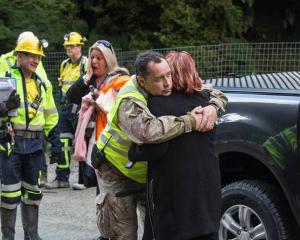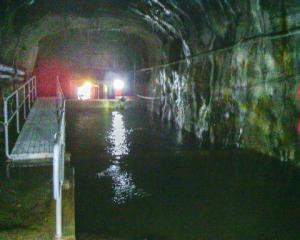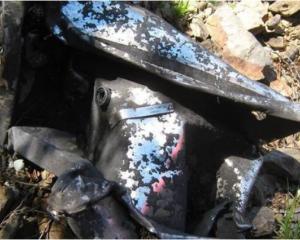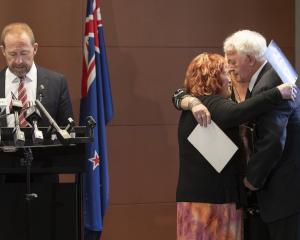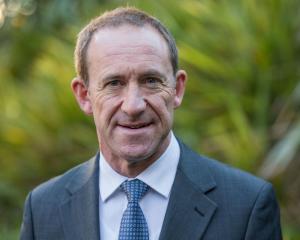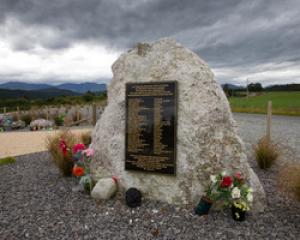
As many as 500 people with family connections to the 29 miners lost in the Pike River disaster will today be taken on buses to the coal mine.
Until now, family meetings have been held in Greymouth.
Announcing the visit, Pike River Coal chief executive Peter Whittall said some areas of the mine would be off limits for safety reasons.
"They can't go right to the portal, although I'm sure they would really love to go."
Those safety concerns were underlined yesterday just five minutes before the one-week anniversary of the first explosion at 3.44pm when a third underground explosion occurred.
Many of the miners' relatives from overseas and around the country are now in Greymouth and are expected to remain until at least next Thursday's national remembrance service to be held within view of the mountains above the mine, north and inland of the town.
Earlier in the week, an Australian journalist at a press conference with John Key noted how troubled New Zealand's year had been.
The Christchurch earthquake, the collapse of South Canterbury Finance, the fatal crash of an air force helicopter, a military casualty in Afghanistan and now this - the Pike River coal mine disaster.
After the first explosion, miners' families held on to the hope that all or some of the miners might have survived.
Over five days, frustration grew as rescue crews waited at the mine but could not enter because of safety concerns.
On Wednesday afternoon, as the families assembled for their usual midday briefing from police and mine management, spirits were a little higher, lifted by news a bore hole being drilled to test for gas had broken through into the mine and that a different robot brought in from Australia was ready to be deployed.
But when Mr Whittall entered that meeting he knew something the families did not.
There had been the second, even bigger explosion.
And where there had been some hope, now there was none.
Mr Whittall later told the media he found it "absolutely devastating" waiting the 10 or 15 seconds it took for the meeting to quieten down so he could deliver his news.
"It was one of the hardest things I've ever had to say to anyone in my life."
He told the media later he has since been grappling with whether or not he could have broken the news in a better way.
The meeting was over within 10 minutes.
Grey district Mayor Tony Kokshoorn later described a scene of devastation inside the meeting as families' hopes were dashed.
"They just sobbed openly and just fell to the floor and many people were just shouting out anger. They were just sickened by the whole thing. I tell you it was unbelievable.
"This was the West Coast's darkest hour."
Standing outside in the sunshine on that fine, late spring afternoon, unaware of the turmoil inside, the media - as many as 100 reporters and camera operators - waited, as they had done for days.
Perhaps 50 cameras were trained on the doors of the Grey District Council building.
Then came the sound of one woman sobbing and the sight of her dropping to the ground.
Other family members emerged and those pictures have been broadcast around the world.
Before the second explosion there had been sorrow, but also anger at police for a lack of speed in getting rescue crews into the mine itself.
After speaking to the families the next day, Mr Key said the anger had dissipated.
While there were rescue crews with the courage to go underground, into the unknown, the second explosion vindicated those who, in the face of public criticism, had to strength and prudence to refuse entry.
Now, machinery that could not be used while hope survived can be deployed to stabilise the underground atmosphere to reduce the risk so the 29 bodies can be retrieved.
Throughout the ordeal, Greymouth has appeared bright, tidy and prosperous.
How the district will fare without the Pike River mine is an economic concern.
In 2001, the West Coast lost much of its timber milling industry because of a ban on logging native forests.
John Chang, the chief executive of the Development West Coast trust which administers some of the millions of dollars of government compensation paid to the West Coast, told the Otago Daily Times this week he expected the "suspension of operations" at the mine would have a significant and immediate impact on the local economy".
He said there would be a role for the trust but civic leaders and rescuers needed to be given space do their jobs.
"When the dust settles down, when support agencies ... leave in weeks to come, there will be a sense of realisation that at the end of the day it's the community that is left behind to pick up the pieces and we need to help ourselves."



